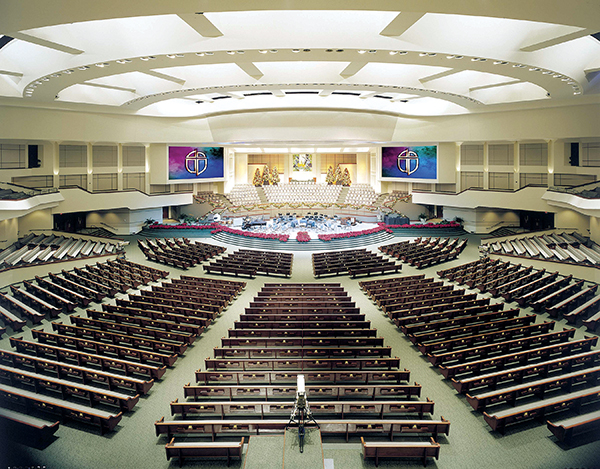By Rik Kirby & Daniel Keller
 If you were ill, you’d seek a qualified doctor to diagnose and treat what ails you. After all, trying to diagnose and treat yourself — without medical expertise — is likely to lead to a bad outcome.
If you were ill, you’d seek a qualified doctor to diagnose and treat what ails you. After all, trying to diagnose and treat yourself — without medical expertise — is likely to lead to a bad outcome.
When you have problems with the sound in your church, the same reasoning applies.
 Trying to solve the issues without professional help is likely to be a waste of time and money, with grim results. The last thing you need is buyer’s remorse after a system is installed because you tried to “wing it” on your own.
Trying to solve the issues without professional help is likely to be a waste of time and money, with grim results. The last thing you need is buyer’s remorse after a system is installed because you tried to “wing it” on your own.
A professional systems designer will work with you to analyze your church’s space and needs and create a system that sounds great, is consistent with your message and budget, is easy to operate, and suits the type of service and events your church hosts. Your congregation will enjoy the results for many years to come, and you’ll save money by avoiding waste and false starts with equipment that is not best suited to your space or properly installed and adjusted.
The best time to engage a systems consultant is right at the beginning of the process. Before you do, it’s helpful to understand what’s involved in choosing the right team.
 The systems designer
The systems designer
Your church’s new sound system should enable every member of the congregation to clearly hear and understand what is said and to enjoy every note and subtlety of the music, no matter where they’re seated. If sound is bouncing all over the room, for example, speech could be unintelligible and music could turn into a muddled mess.
To achieve clarity and intelligibility, the sound system should direct the sound toward the congregation — not at walls, floors, ceilings, windows and other reflective surfaces. It should also deliver quality sound to hard-to-reach locations, such as balconies.
Assessing how sound will behave in any given space is complicated. While large halls and cathedrals — with their high ceilings, soaring walls, and domed ceilings — are typically challenging, even the smallest sanctuary can have acoustic issues. Designing a system that’s right for your space is a job for a professional system designer who understands the science of acoustics.
Your church’s needs depend on the types of services and events it usually hosts. Traditional services might call for a system entirely focused on speech intelligibility, while contemporary services with a praise band require a system capable of delivering music with great clarity at relatively high sound levels — without seeming too loud. A professional systems designer will take these factors into consideration.
The systems designer will then employ specialized acoustical modeling software to figure out how sound behaves in your space. Armed with this information, they will work with you to identify the best loudspeaker choices and decide where to place them and how to tune them for optimal performance.
The installer
Assuming the design plan meets with your church’s approval and budget, a contractor specialized in sound-system installation will work with the systems designer to implement the plan.
Installation is far more than screwing in a few bolts and mounting brackets; it involves understanding the engineering and legal regulations involved in safely and securely mounting heavy speaker systems in the exact places and angles required by the plan, while protecting and maintaining the beauty of your church.
A good installer also considers access to the system components should they need service — a big deal if you have loudspeakers mounted high overhead or hidden behind a wall panel.
In most cases, your systems designer will know qualified installers with whom they have worked successfully in the past. That gives you a proven team.
The design-build approach
Some firms provide a turnkey package in which one individual or small team handles acoustic analysis and systems design, supplies the sound system, and installs the equipment. This approach is referred to as “design-build.”
This firm might also be an equipment dealer. If the individual or firm is expert in all these disciplines, and coordination is good, everyone involved should be on the same page from the beginning. The design will account for installation challenges because the same person or group handles both — not always the case where the designer and installer are different.
The main drawback to this approach is that each part of the process — acoustic analysis, system design, installation and tuning — is a complex science that takes years to master, so you need to find a firm that has all this expertise. Assuming you can find the right company, design-build is a good way to go.
The consultant and the contractor
An alternative is to choose an independent systems consultant who handles acoustic analysis and specifies the equipment and its placement, while employing a separate contractor that handles installation. Independent systems consultants are not limited to the lines of equipment they sell, so they can recommend whatever they believe best suits your needs.
The contractor is expert in construction, the vagaries of church architecture, and how to legally and safely install audio equipment in a way that carries out the system design while maintaining the aesthetics of your church.
Your systems design consultant and contractor will coordinate to ensure that the design works with the installation considerations. This cooperation is key; if done well, it achieves the same integration as design-build, but with a broader range of expertise and a great choice of equipment.
Getting started

As noted earlier, you should engage an expert as soon as your church has made a decision to investigate a new sound system. That way, your subsequent decisions will be well-informed, and you won’t waste time and money on false starts and blind alleys.
Word-of-mouth is still the tried-and-true way to find this partner. Talk with people at other churches in your region who have been through this process in recent years. You might also learn a lot from schools and other non-church institutions that have hired companies you’re considering.
Ask for references and do some Web research; many firms list past projects on their sites, and you might be able to find and follow up with some of them.
Then, meet with companies who have proven themselves, and decide for yourself which company you want to work with.
With patience and research, you will wind up with a system that will fully satisfy your church’s needs and please your congregation for years to come.
Rik Kirby is Vice President, Sales & Marketing at Renkus-Heinz, Inc. Located in Southern California for more than 35 years, Renkus-Heinz is a manufacturer of high-end professional loudspeaker systems.
Daniel Keller is CEO of Get It In Writing, Inc.®.


